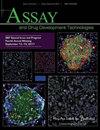利用固态支撑蛋白固定技术识别粘合剂的高通量 DNA编码库亲和选择平台。
IF 1.6
4区 医学
Q4 BIOCHEMICAL RESEARCH METHODS
引用次数: 0
摘要
DNA 编码文库(DEL)已被证明是配体识别工具箱中最强大的技术之一,在学术界或生物技术和制药公司得到广泛应用。DEL 方法利用亲和力选择(AS)来检测感兴趣的蛋白质,从而鉴定结合体。在这里,我们展示了一个高通量、全自动的亲和选择平台,该平台符合工业标准,兼容不同的检测格式,以提高 DEL 粘合剂鉴定的亲和选择过程的可重复性。该平台非常灵活,几乎可以搁置各种 DEL 以及使用固定蛋白的 AS 方法和条件。它有两种主要的固定方法来支持相关蛋白质:磁珠或树脂吸头柱。结合多种方案选项和多种不同的实验条件,可同时处理 96 个样品。此外,只需对实验方案稍作修改,该平台就能灵活运用,不仅能进行常规的 DEL 筛选,还能测试共价库、成功固定感兴趣的蛋白质以及可能需要的许多其他实验。这种用于 DEL 的多功能 AS 平台是学术界和工业界直接应用该技术的有力工具。本文章由计算机程序翻译,如有差异,请以英文原文为准。
High-Throughput DNA-Encoded Libraries Affinity Selection Platform for Binder Identification with Solid Support Protein Immobilization.
DNA-encoded libraries (DELs) have demonstrated to be one of the most powerful technologies within the ligand identification toolbox, widely used either in academia or biotech and pharma companies. DEL methodology utilizes affinity selection (AS) as the approach to interrogate the protein of interest for the identification of binders. Here we present a high-throughput, fully automated AS platform developed to fulfill industrial standards and compatible with different assay formats to improve the reproducibility of the AS process for DEL binders identification. This platform is flexible enough to virtually set aside all kinds of DELs and AS methods and conditions using immobilized proteins. It bears the two main immobilization methods to support of the proteins of interest: magnetic beads or resin tip columns. A combination of a broad variety of protocol options with a wide range of different experimental conditions can be set up with a throughput of 96 samples at the same time. In addition, small modifications of the protocols provide the platform with the versatility to run not only the routine DEL screens, but also test covalent libraries, the successful immobilization of the proteins of interest, and many other experiments that may be required. This versatile AS platform for DEL can be a powerful instrument for direct application of the technology in academic and industry settings.
求助全文
通过发布文献求助,成功后即可免费获取论文全文。
去求助
来源期刊

Assay and drug development technologies
医学-生化研究方法
CiteScore
3.60
自引率
0.00%
发文量
33
审稿时长
>12 weeks
期刊介绍:
ASSAY and Drug Development Technologies provides access to novel techniques and robust tools that enable critical advances in early-stage screening. This research published in the Journal leads to important therapeutics and platforms for drug discovery and development. This reputable peer-reviewed journal features original papers application-oriented technology reviews, topical issues on novel and burgeoning areas of research, and reports in methodology and technology application.
ASSAY and Drug Development Technologies coverage includes:
-Assay design, target development, and high-throughput technologies-
Hit to Lead optimization and medicinal chemistry through preclinical candidate selection-
Lab automation, sample management, bioinformatics, data mining, virtual screening, and data analysis-
Approaches to assays configured for gene families, inherited, and infectious diseases-
Assays and strategies for adapting model organisms to drug discovery-
The use of stem cells as models of disease-
Translation of phenotypic outputs to target identification-
Exploration and mechanistic studies of the technical basis for assay and screening artifacts
 求助内容:
求助内容: 应助结果提醒方式:
应助结果提醒方式:


